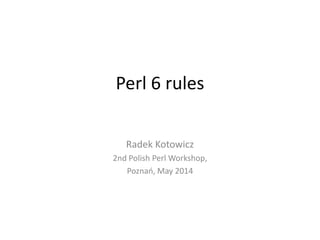Perl 5 & 6 regex complexity
- 1. Perl 6 rules Radek Kotowicz 2nd Polish Perl Workshop, Pozna¨˝, May 2014
- 4. What drives complexity of Perl 5 regex? ? Basic regular expressions (describing regular languages) are easy to match: O(|T|) / O(|r|*|T|) ? Backreferences: ¨C Exponential time O(2^|T|) ¨C NP-complete problem (3SAT reduction) ¨C implicate the use of backtracking algorithms
- 5. ˇ ? Look-behind assertions add even more complexity (input is not consumed): O(2|T|+|r|) ? Experimental features of code assertions introduced undecidability: a=~/<?{do 1 while 2;}>/
- 6. Apocalypse 5 Perl 5 REGEXes were: ? too compact and 'cuteˇ® ? had too much reliance on too few metacharacters ? little support for named captures ? little support for grammars ? poor integration with the 'real' language
- 7. WhatˇŻs new in Perl 6 rules? ? Named captures (backported to 5.10) ? Simpler notation for non-capturing groups ? White spaces ignored unless backspaced ? Simplified code assertions (experimental in 5.18) ? New character classes and set operations on char classes
- 8. Now the big things ? Rules are part of the ˇ®realˇŻ language (same lexer/parser) ? Support for Parsing Expression Grammars (PEGs) ? Backtracking/matching control ? Code assertions can fail or succeed unlike in Perl 5 $perl -e "'abrakadabra'=~/(ab)(?{0}).*(?{print 'OK'})/ˇ° OK $perl6 -e "'abrakadabra'~~/(ab)<?{0}>.*<?{say 'OK'}>/ˇ°
- 9. PEGs ? Similar to CFG but unambiguous in terms of parse trees ? CFG rules explain how to produce words ¨C PEGs explain how to parse them: ¨C CGF for {an bn : n >=1}: ? S -> 'a' S 'bˇ® ? S -> ¦Ĺ ¨C PEG ? S ˇű 'a' S? 'b' ? PEG: negative/positive look-ahead assertions
- 10. ˇ ? With PEGs itˇŻs possible to describe some non- context-free grammars {an bn cn : n >=1} ? Recognizing PEG expressions can be done in linear time if thereˇŻs enough memory ? Rakudo comes with a JSON parser implementation written in Perl 6 rules! ? Naturaly, Perl6 grammar is also expressed in PEG
- 11. Exploratory parsing grammar BookGrammar { rule TOP {<book>+} regex book {<author><whitespace><title> | <title><whitespace><author>} regex author { (<name>|<initial>) [<whitespace>[<name>|<initial>]]? <whitespace> <surename> } rule name {(<word>)<?{ %firstNames{$0}:exists}>} rule surename {<word>} rule title { '"'<word>[<whitespace><word>]*'"'} token word { <alpha>+ } token initial { <alpha>.? } token whitespace {s+} }
- 12. ˇ sub MAIN() { my $match = BookGrammar.parse('Joseph Conrad "Lord Jim"'); say $match; }
- 13. ˇ Joseph Conrad "Lord Jim"" book => "Joseph Conrad "Lord Jim"" author => "Joseph Conrad" 0 => "Joseph" name => "Joseph" 0 => "Joseph" word => "Joseph" alpha => "J" alpha => "o" alpha => "s" alpha => "e" alpha => "p" alpha => "h" whitespace => " " surename => "Conrad" word => "Conrad" alpha => "C" alpha => "o" alpha => "n" alpha => "r" alpha => "a" alpha => "d" whitespace => " " title => ""Lord Jim"" word => "Lord" alpha => "L" alpha => "o" alpha => "r" alpha => "d" whitespace => " " word => "Jim" alpha => "J" alpha => "i" alpha => "m"
- 14. use Grammar::Tracer C:UsersI079489projectsplpw2014>c:rakudobinperl6.exe parse_books.pl ˇű[1mTOPˇű[0m | ˇű[1mbookˇű[0m | | ˇű[1mauthorˇű[0m | | | ˇű[1mnameˇű[0m | | | | ˇű[1mwordˇű[0m | | | | | ˇű[1malphaˇű[0m | | | | | * ˇű[37;42mMATCHˇű[0mˇű[37m "J"ˇű[0m | | | | | ˇű[1malphaˇű[0m | | | | | * ˇű[37;42mMATCHˇű[0mˇű[37m "o"ˇű[0m | | | | | ˇű[1malphaˇű[0m | | | | | * ˇű[37;42mMATCHˇű[0mˇű[37m "s"ˇű[0m | | | | | ˇű[1malphaˇű[0m | | | | | * ˇű[37;42mMATCHˇű[0mˇű[37m "e"ˇű[0m | | | | | ˇű[1malphaˇű[0m | | | | | * ˇű[37;42mMATCHˇű[0mˇű[37m "p"ˇű[0m | | | | | ˇű[1malphaˇű[0m | | | | | * ˇű[37;42mMATCHˇű[0mˇű[37m "h"ˇű[0m | | | | | ˇű[1malphaˇű[0m | | | | | * ˇű[37;41mFAILˇű[0m | | | | * ˇű[37;42mMATCHˇű[0mˇű[37m "Joseph"ˇű[0m | | | * ˇű[37;42mMATCHˇű[0mˇű[37m "Joseph"ˇű[0m | | | ˇű[1mwhitespaceˇű[0m | | | * ˇű[37;42mMATCHˇű[0mˇű[37m " "ˇű[0m | | | ˇű[1mnameˇű[0m | | | | ˇű[1mwordˇű[0m | | | | | ˇű[1malphaˇű[0m | | | | | * ˇű[37;42mMATCHˇű[0mˇű[37m "C"ˇű[0m | | | | | ˇű[1malphaˇű[0m | | | | | * ˇű[37;42mMATCHˇű[0mˇű[37m "o"ˇű[0m | | | | | ˇű[1malphaˇű[0m | | | | | * ˇű[37;42mMATCHˇű[0mˇű[37m "n"ˇű[0m | | | | | ˇű[1malphaˇű[0m | | | | | * ˇű[37;42mMATCHˇű[0mˇű[37m "r"ˇű[0m
- 15. ThatˇŻs it
- 16. Thank you!











![Exploratory parsing
grammar BookGrammar {
rule TOP {<book>+}
regex book {<author><whitespace><title> | <title><whitespace><author>}
regex author { (<name>|<initial>) [<whitespace>[<name>|<initial>]]?
<whitespace> <surename> }
rule name {(<word>)<?{ %firstNames{$0}:exists}>}
rule surename {<word>}
rule title { '"'<word>[<whitespace><word>]*'"'}
token word { <alpha>+ }
token initial { <alpha>.? }
token whitespace {s+}
}](https://image.slidesharecdn.com/perl6regexcomplexity-150520150613-lva1-app6892/85/Perl-5-6-regex-complexity-11-320.jpg)




